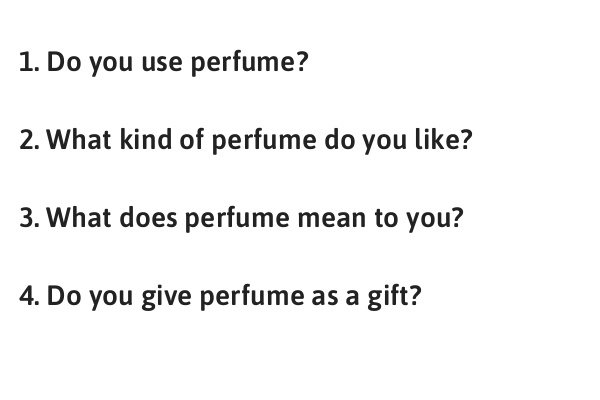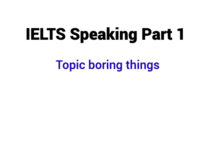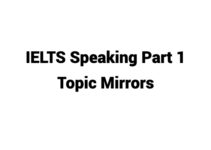Table of Contents
Topic Perfume

Sample answers
1. Do you use perfume?
Yes, I do, but not very often. I try not to wear perfume around people who might have a sensitivity to it. I know a few people who get a headache when they’re around people wearing fragrances, so if I’m not sure I just don’t. But there is no doubt that perfumes can be a woman’s best friend at certain times. It is an effective method to capture attention or form a good impression.
2. What kind of perfume do you like?
I am not a perfume enthusiast, so I don’t possess many kinds of perfume. I received a bottle from Zara as a gift and I use it sparingly, whenever on special occasions. It just makes me feel bold yet airy and comfortable. I can detect hints of vanilla and cinnamon and a top note of orange gives this a nice citrusy twist but it is by no means a fruity scent.
3. What does perfume mean to you?
Fragrance or perfume, is evocative of an innumerable amount of things; memories, places, people, the list goes on. There’s always one particular scent that reminds you of a perfect holiday you took last summer or of your lovely ex-boyfriend. And the same goes for the perfume that makes you feel sexy; your ‘going out’ perfume and even your ‘everyday’ perfume will conjure up some memories of people and places, and good times.
4. Do you give perfume as a gift?
Well, not really.
I only know some mainstream fragrances and I could hardly guess one’s tastes, so it’s a risky kind of gift most of the time. A perfume could be an option as a gift for our spouse, parents or children and eventually siblings or very close friends. It is an inappropriate present for a colleague, someone we barely know or someone we have work relationships with.
Vocabulary

1. sensitivity [n]: the quality of being easily upset by the things people say or do, or causing people to be upset, embarrassed, or angry
Eg: I should have warned you about her sensitivity to criticism.
2. capture [v]: if something captures your imagination or attention, you feel very interested and excited by it
Eg: The American drive to land a man on the Moon captured the imagination/attention of the whole world.
3. sparingly [adv]: in small amounts, or without wasting any
Eg: There wasn’t enough coal during the war, so we had to use it sparingly.
4. detect [v]: to notice something that is partly hidden or not clear or to discover something.
Eg: Some sounds cannot be detected by the human ear.
5. by no means [expression]: not at all
Eg: It is by no means clear what the president can do to end the strike.
6. evocative [adj]: making you remember or imagine something pleasant
Eg: On this model, two or more different symbolic systems can be equally expressive and evocative of genuine religious experience.
7. conjure up [v]: to make a picture or idea appear in someone’s mind.
Eg: The glittering ceremony conjured up images of Russia’s imperial past.
8. mainstream [adj]:
Eg: The story was largely ignored by the mainstream press.
9. spouse [n]: a person’s husband or wife.
Eg: In 60 percent of the households surveyed both spouses went out to work.
10. inappropriate [adj]: unsuitable.
Eg: His casual behavior was wholly inappropriate for such a formal occasion.


